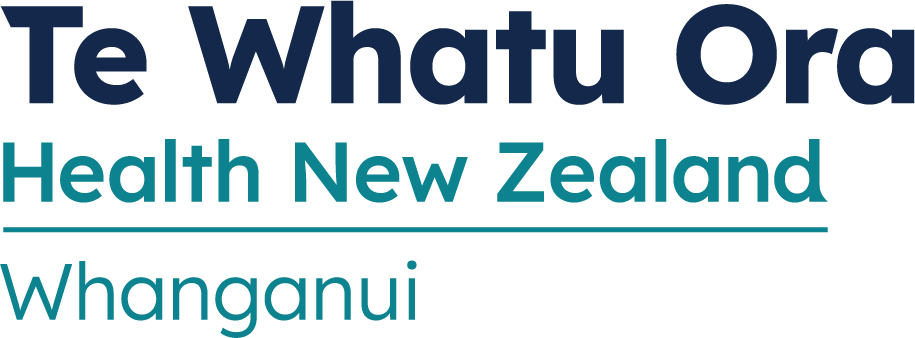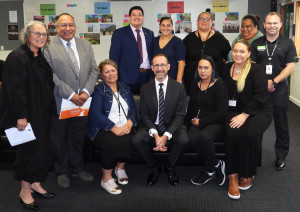

Health minister Andrew Little (seated, centre) celebrates the new service with (from left) Wheturangi Walsh-Tapiata, MP Adrian Rurawhe, Tracy Tamou, Elijah Pue, Mihipeka McKenzie-Mason, Karen Araiti-Wikita, Avismary Bennett, Hinetearorangi Kawana, Mel Pera and DHB chief executive Russell Simpson.
6 April 2021
Minister of Health Andrew Little was given an insight into a new pregnancy and parenting service on a visit to Whanganui on 1 April.
And the minister – hosted at iwi health and social services provider Te Oranganui -- was most impressed with what he learned about He Puna Ora.
Translated as "the source of wellness", He Puna Ora is an initiative to help vulnerable mothers, babies and their whānau.
A partnership between Whanganui District Health Board and local iwi health services, the programme was launched in March and aims to help 100 at-risk families each year.
“There are many mums who are vulnerable due to a whole range of circumstances, and they need support services,” Mr Little told the gathering at Te Oranganui.
“It is great to see the model of how He Puna Ora was put together, drawing on community knowledge and understanding.”
The programme was designed after extensive consultation with the community, and Mr Little said it reflected some of the ideas that would underpin the upcoming reform of the national health and disability service.
He said it was an example of how the benefits of grounded local communities could promote better health outcomes for vulnerable people.
“You hand over to the community the opportunity to design what is needed. The more we do at this sort of level, the more it takes the pressure off GPs and the hospital services.
“For those doing the mahi – thank you. You will do great things for mums and children, making sure children get the best out of life.”
The service is being delivered by the Māori Health Outcomes Advisory Group, a collaborative of Te Oranganui Trust, Te Kotuku Hauora, Ngā Waihua o Paerangi Trust, Te Puke Karanga Health, and Mōkai Pātea Services.
It specifically targets mothers and whānau with children under three years where there are issues with alcohol and/or drugs, and poor connections to health and social services. It will offer clinical services and also one-to-one support.
Te Oranganui chief executive Wheturangi Walsh-Tapiata commented: “We might think we understand what is happening for whānau, we might think we understand what is happening for hapū māmā, but the true voice is those most affected by the issues.
"We have come up with what we believe is quite a unique service that serves the DHB rohe."
She said He Puna Ora was a reflection of iwi providers’ relationship with the DHB – “a true relationship rather than something just written on paper”.
“And in our relationship with the DHB we are open to challenging one another.”
DHB chief executive Russell Simpson also noted the strength of the relationship, and said the aim was to build the capability and capacity of kaupapa Māori health services.
“He Puna Ora was designed by our people for our people. This is the community in action; this is our rohe really coming to life.”
Whanganui DHB will fund the pregnancy and parenting service with $1 million per year and it is now one of six rolled out across New Zealand, joining Waitemata, Hawke’s Bay, Northland, Gisborne and the Eastern Bay of Plenty.



